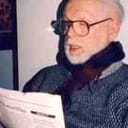Stay in the Loop
BSR publishes on a weekly schedule, with an email newsletter every Wednesday and Thursday morning. There’s no paywall, and subscribing is always free.
Power of the pen, or: This author could destroy my life's work
My problem with Junot Diaz's 'Oscar Wao'

In my career-long scheme to de-exceptionalize "American Literature" into "Global English," the first public gesture was the seminar I organized at Beaver College in 1978 with the future Nobel Laureate Seamus Heaney, the African American Brown University professor and poet Michael S. Harper, and Rex Nettleford, the soi-disant Thomas Jefferson of Jamaica's University of the West Indies. We set out to terminate the "We protest too much" uniqueness of American culture by introducing American literature teachers to their global cousins.
My plan was simple enough: Stretch the U.S. canon by slyly introducing, first, black American Lit, followed by the analogous but disgracefully underknown white Appalachian Lit. Before we could convince teachers that they were unnecessarily ignorant of their English speaking and writing counterparts in the six other continents, I figured, they should become ashamed of their hometown anonymities.
I had recently visited forbidden Cuba (remember the Jimmy Carter thaw in the late '70s), Jamaica, Puerto Rico, Haiti and San Domingo. Not the least of my late enlightenments was how imperially and falsely we Americans had abused these nearby neighbors. Our City on the Hill complex needed revision, if not utter destruction.
Imagine my excitement
I had played a new Wole Soyinka film at the Commonwealth Educational Conference in Lagos, Nigeria, in 1966, urging the creation of a global film library of literary first takes on all the English-speaking Commonwealth countries. We Americans, I believed, had a lot to learn from Britain, Australia, Canada and New Zealand. That lesson might lessen our hubris sufficiently to see what the "new" Commonwealth countries like Nigeria were achieving with the likes of the novelist Chinua Achebe, whose Things Fall Apart unsentimentally dissects the effects of Western colonialism on Igbo Nigerian society.
So I was constantly on the lookout for new titles that would, at the very least, instruct us in the uniqueness of their authors' views of our shared global culture. The tense was future: trying to share with "strangers" what we all must share, willy nilly, in a tremendously precarious future, the way serious literature uniquely informs us about the singularities of our common predicaments.
So imagine my recent excitement to learn about Junot Diaz, a new young writer from the Dominican Republic, currently a professor of creative writing at no less a university than MIT. In my shallow science awareness, I was pleasantly surprised and could hardly wait for interlibrary loan to deliver Diaz's The Brief Wondrous Life of Oscar Wao.
Diaz was born in Santo Domingo, got his B.A. at Rutgers and an M.F.A. from Cornell. His first book, a collection of short stories titled Drown, was described by Hermione Lee in Britain's Sunday Independent as "a dazzling talented first book." Then Diaz won a Pulitzer Prize and the American Book Critics Circle Award for Oscar Wao.
Disgusting loser
Not from me he wouldn't have. His Oscar character is the most disgusting loser I've encountered in almost a century of compulsive reading. And the book begins and ends with this fat, sloppy sci-fi freak would-be, trying mostly unsuccessfully to get laid— until he moves next door to a retired whore "in love" with a cop.
Oscar Wao contains much (too much) trash about the sexual gifts of the run-of-the-bed Dominican. (Oscar, the author endlessly reminds us, would win no Oscars for his equipment!) When he finally "scores" with her, the whore's cop sics his colleagues after Oscar to beat him to a pulp in a canebrake— the favorite venue for dictator Trujillo's thugs to dispose of unhappy constituents.
This "novel" reads more like a collection of short stories about the educational sorties of Oscar's relatives that are never properly separated— a new genre of run-on short stories. But it did prick my curiosity about the history of Trujillo's decades-long dictatorship as well as American collusions and destructions thereby.
Unreadable footnotes
But Diaz has devised the shtick of almost unreadable footnotes that suddenly appear erratically when Diaz briefly gets "serious." (I got more of the details of historical significance from Wikipedia.) And there are so damn many Spanish phrases— even sentences— interpolated to sustain his ironic poses toward the Plot. It's a verbal tic, simulating seriousness.
Diaz is especially enamored of the term fukÓ¹, accent grave on the second "u." Sometimes it seems to mean "fate" (inordinately and universally bad, in his family). Elsewhere it means, crudely, "fuck you," for no observable reason, except to lend a phony seriousness to an absurdly unserious plot.
And Diaz inserts so many made-up or at least un-dictionaried Hispasms that I wanted to hit him over the head with my temporarily useless Spanish Dictionary.
Guardian gush
The blurb from The Guardian on the book's front cover bleats, "Exotic, original and spirited, it's written with huge energy and heart." And no visible brain, I would add.
It's "wondrous" that Oscar Wao ever got published, as is. Drown, alas, is already on its interlibrary way to my home. I hope Diaz swims better in smaller pools.
I've spent much of my career trying to broaden Americans' literary horizons beyond our own narrow shores. Writers like Diaz could drown my entire theory. It's not exactly the sort of overseas talent I had in mind.
My plan was simple enough: Stretch the U.S. canon by slyly introducing, first, black American Lit, followed by the analogous but disgracefully underknown white Appalachian Lit. Before we could convince teachers that they were unnecessarily ignorant of their English speaking and writing counterparts in the six other continents, I figured, they should become ashamed of their hometown anonymities.
I had recently visited forbidden Cuba (remember the Jimmy Carter thaw in the late '70s), Jamaica, Puerto Rico, Haiti and San Domingo. Not the least of my late enlightenments was how imperially and falsely we Americans had abused these nearby neighbors. Our City on the Hill complex needed revision, if not utter destruction.
Imagine my excitement
I had played a new Wole Soyinka film at the Commonwealth Educational Conference in Lagos, Nigeria, in 1966, urging the creation of a global film library of literary first takes on all the English-speaking Commonwealth countries. We Americans, I believed, had a lot to learn from Britain, Australia, Canada and New Zealand. That lesson might lessen our hubris sufficiently to see what the "new" Commonwealth countries like Nigeria were achieving with the likes of the novelist Chinua Achebe, whose Things Fall Apart unsentimentally dissects the effects of Western colonialism on Igbo Nigerian society.
So I was constantly on the lookout for new titles that would, at the very least, instruct us in the uniqueness of their authors' views of our shared global culture. The tense was future: trying to share with "strangers" what we all must share, willy nilly, in a tremendously precarious future, the way serious literature uniquely informs us about the singularities of our common predicaments.
So imagine my recent excitement to learn about Junot Diaz, a new young writer from the Dominican Republic, currently a professor of creative writing at no less a university than MIT. In my shallow science awareness, I was pleasantly surprised and could hardly wait for interlibrary loan to deliver Diaz's The Brief Wondrous Life of Oscar Wao.
Diaz was born in Santo Domingo, got his B.A. at Rutgers and an M.F.A. from Cornell. His first book, a collection of short stories titled Drown, was described by Hermione Lee in Britain's Sunday Independent as "a dazzling talented first book." Then Diaz won a Pulitzer Prize and the American Book Critics Circle Award for Oscar Wao.
Disgusting loser
Not from me he wouldn't have. His Oscar character is the most disgusting loser I've encountered in almost a century of compulsive reading. And the book begins and ends with this fat, sloppy sci-fi freak would-be, trying mostly unsuccessfully to get laid— until he moves next door to a retired whore "in love" with a cop.
Oscar Wao contains much (too much) trash about the sexual gifts of the run-of-the-bed Dominican. (Oscar, the author endlessly reminds us, would win no Oscars for his equipment!) When he finally "scores" with her, the whore's cop sics his colleagues after Oscar to beat him to a pulp in a canebrake— the favorite venue for dictator Trujillo's thugs to dispose of unhappy constituents.
This "novel" reads more like a collection of short stories about the educational sorties of Oscar's relatives that are never properly separated— a new genre of run-on short stories. But it did prick my curiosity about the history of Trujillo's decades-long dictatorship as well as American collusions and destructions thereby.
Unreadable footnotes
But Diaz has devised the shtick of almost unreadable footnotes that suddenly appear erratically when Diaz briefly gets "serious." (I got more of the details of historical significance from Wikipedia.) And there are so damn many Spanish phrases— even sentences— interpolated to sustain his ironic poses toward the Plot. It's a verbal tic, simulating seriousness.
Diaz is especially enamored of the term fukÓ¹, accent grave on the second "u." Sometimes it seems to mean "fate" (inordinately and universally bad, in his family). Elsewhere it means, crudely, "fuck you," for no observable reason, except to lend a phony seriousness to an absurdly unserious plot.
And Diaz inserts so many made-up or at least un-dictionaried Hispasms that I wanted to hit him over the head with my temporarily useless Spanish Dictionary.
Guardian gush
The blurb from The Guardian on the book's front cover bleats, "Exotic, original and spirited, it's written with huge energy and heart." And no visible brain, I would add.
It's "wondrous" that Oscar Wao ever got published, as is. Drown, alas, is already on its interlibrary way to my home. I hope Diaz swims better in smaller pools.
I've spent much of my career trying to broaden Americans' literary horizons beyond our own narrow shores. Writers like Diaz could drown my entire theory. It's not exactly the sort of overseas talent I had in mind.
What, When, Where
The Brief Wondrous Life of Oscar Wao. By Junot Diaz. Penguin, 2007. 339 pages, $24.95. www.us.penguingroup.com.
Sign up for our newsletter
All of the week's new articles, all in one place. Sign up for the free weekly BSR newsletters, and don't miss a conversation.

 Patrick D. Hazard
Patrick D. Hazard